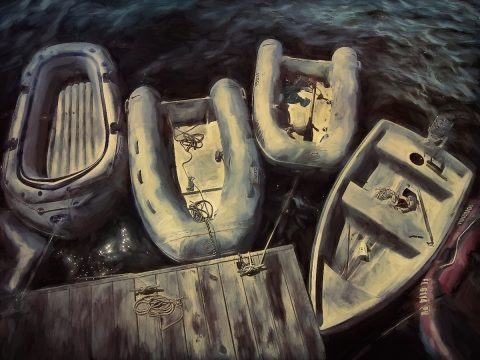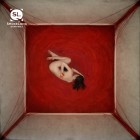Tell me about the beginnings of this story. How did you start writing it? What did this beginning feel like?
I lived in Johnson, Vermont for a summer and spent a lot of time at the bank of the small river that cut through town. I remembered from fishing as a child that salmon are semelparous and return from the sea to reproduce in the freshwater beds they were born in. I was fascinated with the counterintuitiveness of this behavior and of the incredible journey home of sometimes hundreds of miles of upstream swimming they make, only to bear life and then expire. The notion of watching one another perish really struck me, and that sort of led to this idea for a piece about returning home to a dying sibling.
In the narrator’s imagination, she parachuted down Mt. Rainer with a broken-winged bird. But this imaginary circumstance holds so much weight and feels very tangible and real. What power do you think resides in our imaginations–can you describe it?
In one sense, every moment that isn’t the literal one we’re living in, is fantasy–either of our perception of the way we had experienced a moment, or the way we hope or believe a moment will occur in the future. All of these constructions or reconstructions of events are dependent on a kind of stew of imagination, memory, and dreams to line them. For me those three forms really aren’t all that distinctive in the sense that they rely on one other for material. In this story I play with the idea of how people use imagination to cope with crisis and trauma–a notion and behavior I’m particularly fascinated by. It’s interesting to think about how the power of our imaginations can quite literally carry us through calamity. The narrator and Beatrice play this game where they report to one another about their fantastical lives and in one sense, they do this to humor to each other. In another sense however, they do it because it takes them back to their childlike way of being as sisters and aids in communicating subtext to one another. In the narrator’s imagination she is a powerful savior–a role she wishes she could serve for Beatrice, but can’t. In some ways, she uses her own imagination to prop herself up and find her place during this terrible circumstance.
Perspective can be extremely powerful, too. The way we perceive nature, for example, can be extraordinary. In this story, the way salmon swim upstream, mate, and make nests — only to die from exhaustion and be pushed with the current, is a guidebook for the narrator. Can you talk about how nature can become a guide for us? A map of sorts–a teacher?
Nature, and the animal world in particular, is teeming with all sorts of mysterious and fantastical realities that are really prime seeds for growing fiction. I’m in awe of the processes of the natural world that mirror (or sometimes contrast to) the way that we as humans navigate life. The parallels so often go unnoticed, but when you stop and watch or read about them, you begin to see the poetry in these incredibly unique behaviors. The things that animals experience are as equally terrifying and tragic as the ones we do, it’s just that we tend to compartmentalize them as being, well, natural, and so not as tethered to emotion. What I like to think about is how nature can be used to level set us, to help demonstrate for us that these terrible things we face and endure as humans–choices, loss, turmoil–are universal to things experienced by most all living things. Thinking about that concept helps in some small ways I guess, to help make sense of painful events.
If you could say one thing to Beatrice, what would it be?
What I attempted to capture in Beatrice was her ability to hold onto humor at the doorstep of death to shoulder herself and the others around her through it. I would say that I think this approach is a life ended with grace and dignity.
The narrator?
The narrator keeps retreating away from things in the story–from the river, from skipping stones, from her sister’s body. It’s easy to do this when someone we love is so fragile, but in the end, the looking and studying will be the snapshots that we rely on to keep them going in our lives–in our memories, dreams, and imagination, forever. We have to sometimes fight against that impulse and really look before it’s too late.



 The core workshop of SmokeLong Fitness is all in writing, so you can take part from anywhere at anytime. We are excited about creating a supportive, consistent and structured environment for flash writers to work on their craft in a community. We are thrilled and proud to say that our workshop participants have won, placed, or been listed in every major flash competition. Community works.
The core workshop of SmokeLong Fitness is all in writing, so you can take part from anywhere at anytime. We are excited about creating a supportive, consistent and structured environment for flash writers to work on their craft in a community. We are thrilled and proud to say that our workshop participants have won, placed, or been listed in every major flash competition. Community works.